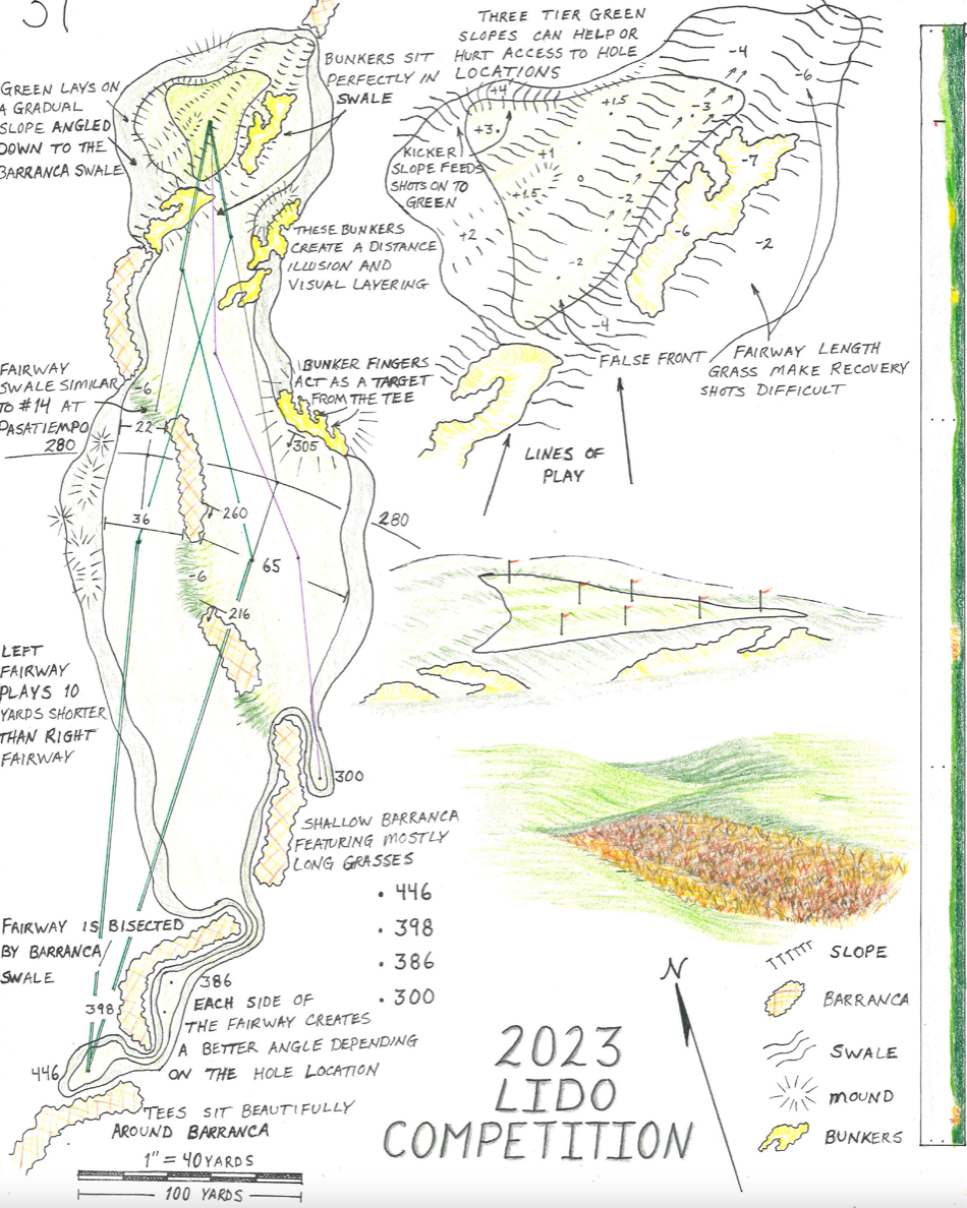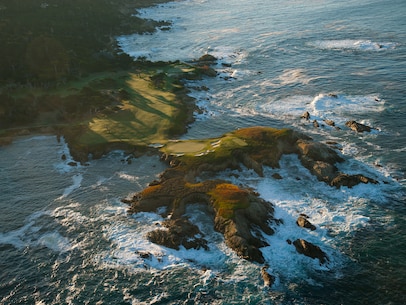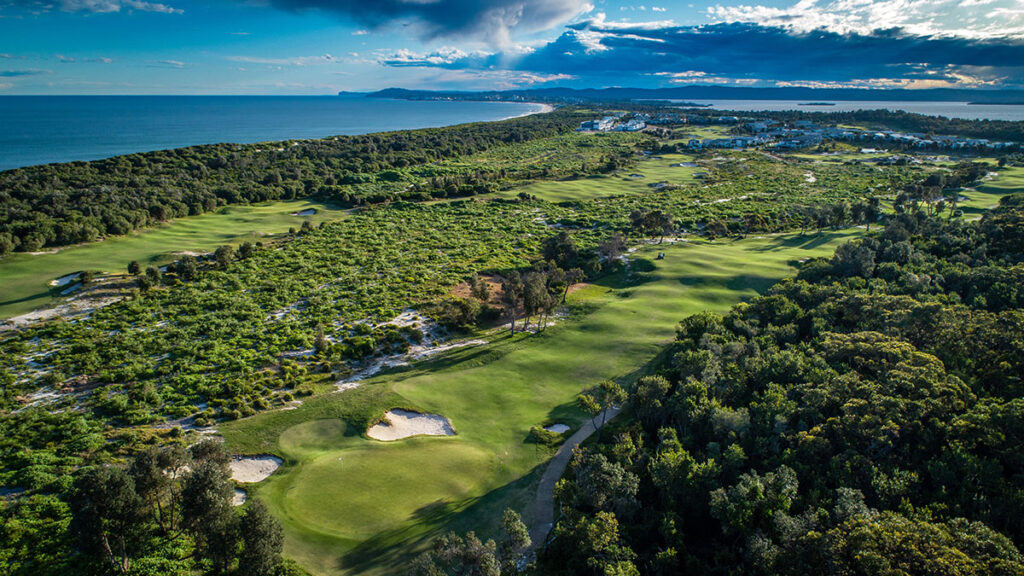The respect and study of golf course architecture from the 1910s and ‘20s has never been more alive than it currently is. An aspiring architect who can transform that knowledge into a compelling drawing can earn an invitation to Cypress Point Club, ranked third on America’s 100 Greatest Courses, through the latest installment of the Alister MacKenzie Society’s “Ray Haddock Lido Prize.”
The Lido Prize, in addition to being a highly competitive design competition, helps keep the torch burning for the appreciation of Golden Age architecture.
During the years following World War II, the styles and ideas put forth by 1920s designers like MacKenzie, Seth Raynor, George Thomas and others were typically taken for granted as American golfers embraced a new, modern era that prioritized efficiency, convenience and function. Golf design, like many areas of art and commerce, increasingly looked toward the future rather than the past.
As interest in the game exploded, courses built from the 1950s though the 1980s embraced state-of-the-art construction and architectural utilitarianism. Those from prior decades were also updated with new technologies and streamlined with post-War and late 20th century desires in mind. Subsequently, the architecture created before the Great Depression receded under the weight of time and renovation, a lightly regarded artifact if it was regarded at all.
That began to change in the 1990s as a more curious generation of designers began looking into the buried histories of clubs across the country and noticed that the courses they’d been hired to renovate, yet again, often looked little like what was originally built. This coincided with the establishment of historical organizations like the Alister MacKenzie Society and the Donald Ross Society that were dedicated to preserving and restoring the work of their patron architects.

The winning 2023 design.
The awakening means that today there are very few clubs remaining that are not aware of their origins. Historical discoveries continue to be made that give designers a clearer view of the 1920s, and memberships have embraced these heritages and spent enormous resources reestablishing the architectural presentation and tenets that had been lost.
That historical respect has passed to a younger generation of architect and aficionado, lit by the annual candlelight of traditions such as the Lido Prize, now in its 25th year.
Since 1998, the Society has asked armchair architects to design a hole that embodies the design philosophy of MacKenzie, including an emphasis on playability for all level of golfers, various ways to access greens, artistic hazards and robustly shaped greens.
Designs for this year’s contest are to be a two-shot hole between 360 and 460 yards from back of tee to middle of green. The entries must be drawn by hand and can be in black and white, or color, but should show architectural features that distinguish the hole as one that MacKenzie would have designed.
The winner of the Lido contest will receive a $3,000 cash prize and an invitation to the annual Alister MacKenzie Society gathering, held this year at Cypress Point Club. A $2,000 travel expenditure bonus will also be offered.
 Private 3. (3) Cypress Point Club Pebble Beach, CA 5 231 Panelists
Private 3. (3) Cypress Point Club Pebble Beach, CA 5 231 Panelists
- 100 Greatest
- Best In State
From Golf Digest Architecture Editor emeritus Ron Whitten:
Cypress Point, the sublime Monterey Peninsula work of sandbox sculpture, whittled Cypress and chiseled coastline, has become Exhibit A in the argument that classic architecture has been rendered ineffectual by modern technology.
I’m not buying that argument. Those who think teeny old Cypress Point is defenseless miss the point of Alister MacKenzie’s marvelous design.
MacKenzie relished the idea that Cypress Point would offer all sorts of ways to play every hole. That philosophy still thrives, particularly in the past decade, after the faithful restoration of MacKenzie’s original bunkers by veteran course superintendent Jeff Markow. Explore our complete review here—including bonus photography and ratings from our expert panelists.
Full Review
Deadline for submissions is May 1, 2024, and the winner will be announced May 15, 2024.
Full rules and regulations for the contest can be found at the Lido Contest website here.
The winners from previous years include many who went on to become practicing architects.
2023—Craig Snyder (judge: Tom Naccarato)
2022—Bo Links (Bruce Charlton)
2021—Bo Links (Todd Eckinrode)
2020—NO COMPETITION
2019—Cameron Hurdus (Tood Eckinrode/Gene Zanardi)
2018—David Hoekstra (David Dale)
2017—Brian Orellana (Ron Whitten/Gene Zanardi)
2016—Cameron Hurdus (Rees Jones)
2015—Clyde Johnson (Jim Urbina)
2014—Riley Johns (Jay Blasi)
2013—William Kendall (Todd Eckinrode)
2012—Cameron Hurdus (Forrest Richardson)
2011—David Hoekstra (Brian Costello)
2010—Peter Zarlengo (Thad Layton)
2009—Jeff Martz (Robert Trent Jones II)
2008—Bo Links (Sandy Tatum)
2007—Bo Links (Ron Whitten)
2006—Jim Leigh (Don Knott)
2005—Per Thunberg (Kyle Phillips)
2004—NO COMPETITION
2003—Thad Layton (Mike DeVries)
2002—Simon Ford (Mike DeVries)
2001—Tyler Sullivan (Nick Faldo)
2000—Phil Vantier (Ben Crenshaw)
1999—Lance Dickinson (Gary Player)
1998—Todd Duguid (Arnold Palmer/Ed Seay)
See The AMS Ray Haddock Lido Prize for more information.
• • •
Explore Golf Digest’s new Course Reviews section where you can submit a star rating and evaluation on all the courses you’ve played. We’ve collected tens of thousands of reviews from our course-ranking panelists to deliver a premium experience, which includes course rankings, experts’ opinions, bonus course photography, videos and much more. Check it out here!
This article was originally published on golfdigest.com




